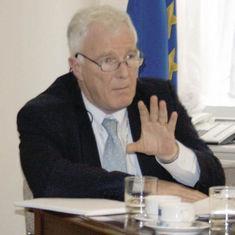

The European Commission proposed reforms to the Common Market Organisation (CMO) for fruit and vegetables this week that would see many of the industry’s €1.5 billion (£1bn) subsidies scrapped, with funding prioritised towards increasing consumption and protecting the environment.
At a briefing on the reform held in London on Wednesday, Russell Mildon, director of DG Agriculture at the Commission, said the proposals would bring the fruit and vegetable sector closer in line with the rest of the reformed Common Agricultural Policy (CAP) by integrating it into the Single Payment Scheme (SPS).
The Commission is calling for a decoupling of subsidies for producing and processing fruit and vegetables, such that producers would be paid for their role as “custodians of the land”, rather than for what they do with it, Mildon said.
Under the new system, member states would be allowed to choose which farmers are eligible for the new entitlements based on a representative period. The payments would be calculated by area and recipients would have to spend at least 20 per cent of their expenditure on environmental measures.
The total funding to be transferred to the SPS is around £800 million (£540m).
The reform aims to encourage more growers to join Producer Organisations (POs) as an effective method of rolling out better crisis management and facing up to the challenges presented by the retail sector.
The proposed tools for crisis management include green harvesting and non-harvesting, promotion and communication, training and crop insurance.
Speaking before the briefing, EU agriculture commissioner Marianne Fischer Boel said: “It is through POs that individual producers can stand up to the retail giants. In some parts of the European Union, this is what happens but not in all. There are far too many producers who go it alone - and they find they are no match for the retailers.”
Mildon said the rules for POs would be simplified and he urged them to group together for marketing purposes to be eligible for more of the €700m (£470m) PO budget.
However, under the new system POs would only qualify for 50 per cent compensation for withdrawing perishable products from an oversupplied market, rather than the full reimbursement offered now. Instead, the EC will still cover the full cost if products are redirected for free distribution in schools and other institutions.
Mildon said all other efforts to increase produce consumption would be widely encouraged as well.
As such, while local production would never be favoured at the expense of imports, regional promotion would be acceptable, he claimed.
“We are not going to allow false affirmations that suggest foreign products are worse but if someone can establish a reputation for a region, it is perfectly legitimate to promote that reputation.
“And we would not only endorse that but contribute to it if it lends itself to promoting fruit and vegetable consumption,” Milton added.
Organic producers would also be eligible for funds, at a co-financing rate of 60 per cent for each operational programme, based on the premise that the programmes promote sustainability.